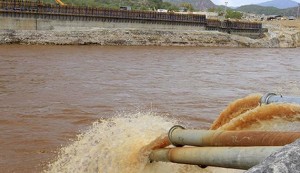Nile Tributary Nations’ Dispute over Renaissance Dam Persist
Africa’s largest hydropower project – the Grand Ethiopian Renaissance Dam – is reportedly under threat, as Egypt and Ethiopia are yet to transverse a deadlock in negotiations over the Nile’s flow, reports indicate.
The construction of the dam, taking place on the Blue Nile, led Egyptian authorities to raise alarm that the project would the limit the supply of one of the arid nation’s only source of water.
Hazem Beblawi, Egypt’s acting Prime Minister, stated during an interview that numerous obstacles continue to mar the negotiations over the dam. He further asserted that the project has both financial and technical problems.
Last week, delegations from Egypt, Sudan and Ethiopia met for negotiations in Khartoum. However, the meeting was called off after the Ethiopian and Egyptian delegations – the two parties at the centre of this impasse – supposedly declined to hold direct talks.
The completion of the 6,000 MW Grand Renaissance Dam is set for 2017 at a cost of $4.8 billion USD. Ethiopia argues that the dam will improve power supply and agricultural development in the region without causing a substantial water loss to the coveted Nile.
Egypt, on the other hand, bases its argument on colonial era agreements between tributary nations, which accords it about 55.5 billion cubic meters of the Nile’s water. Ethiopian authorities have allegedly rejected this accord, since it was not a signatory. Ethiopian authorities further maintain that Egypt’s domination of the River Nile has unjustly deprived it of a fundamental resource. To this end, several of the Nile tributary nations, excluding Egypt, have entered into a new agreement, which is purported to distribute the water of the fabled river equitably.
Historically, Egypt has gained influence in the region from securing almost total control of the Nile, but Ethiopia has purportedly rejected recent attempts to prolong this status quo. Meanwhile, observers say the Egyptian government seems determined to maintain its dominance of the Nile, arguing that it is an issue of national security and that they in fact require an even larger water share now because of the growing population. It is alleged that Egyptian politicians have even proposed the use of force against Ethiopia to prevent the dam’s completion.
According to reports, Ethiopian authorities have turned down numerous Egyptian proposals concerning the dam, including one to form a panel comprising neutral experts to arbitrate any dispute emerging from scheduled studies of the dam’s environmental and hydrological impact.
This has consequently resulted in efforts to include civil institutions and organizations in an attempt to discover popular substitutes to negotiations.
On this note, a meeting took place in December 2013 in Cairo with representatives from Egypt, Sudan, Eritrea, and UNESCO in attendance. The meeting sought to decrease the political effects of the impasse and unearth a way to preserve an open communication line between the governments.
The two-day discussions ended with high hopes of NGOs playing an efficient role in bridging the communication lines between the two countries.
According to observers, the opposing demands of the two nations about the Nile is indicative of comparable opposing claims over insufficient water resources in other countries as well.
They add that, water resources disregard political boundaries, therefore relevant parties should learn to administer the world’s collective water supplies as allies instead of adversaries. Otherwise, we will all face the consequences of rising water shortages.
Photo: Tiksa Negeri/Reuters
